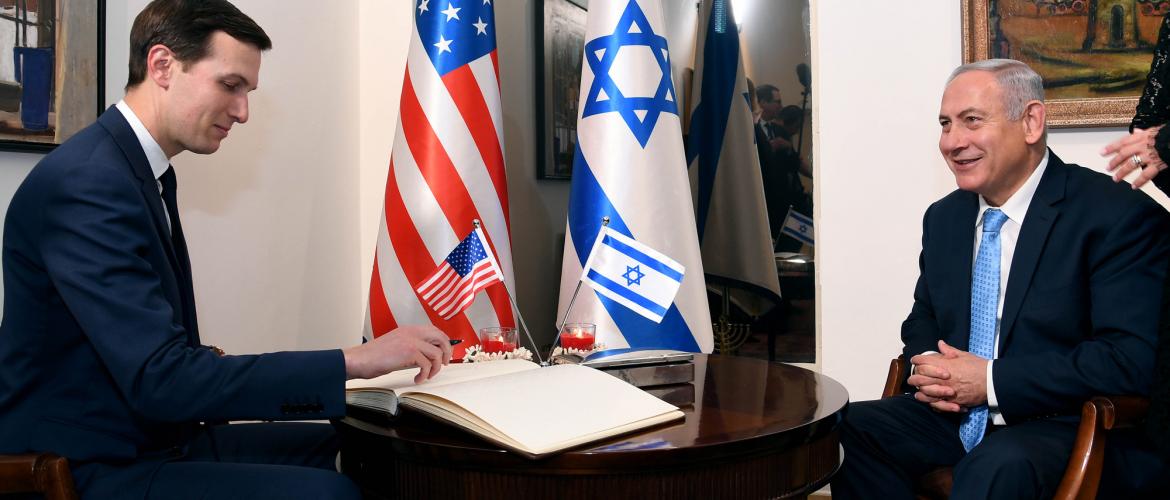The Kushner plan starts with economic investment
May 21, 2019 | Expert Insights

Background
The ongoing conflict between the modern state of Israel and Arab Palestine can be traced back to the creation of Israel as the world’s only Jewish state. In 1947, the United Nations adopted a plan to partition Palestine into Arab and Jewish sections. Immediately, violence broke out between the two groups, eventually drawing Israel’s neighbours into a war. Despite this, the roots of the dispute are from before 1947, tracing back to the Biblical era and Jewish immigration to Palestine in the 19th and 20th Century.
Israelis and Palestinians both claim Jerusalem as their capital. The State of Israel maintains its primary governmental institutions in Jerusalem, while the State of Palestine ultimately foresees the city as its seat of power. Other unresolved issues between the two sides include mutual recognition, borders, security, water rights, Israeli settlements, Palestinian freedom of movement, and the Palestinian right of return. Any peace plan presented without answers to all or most of these issues is likely to fail.
President Trump’s “deal of the century” to resolve the Arab-Israeli conflict is led by his advisor and son-in-law, Jared Kushner. Analysts believe that the plan is likely to heavily favour Israel, considering the lack of Palestinian participation and Mr Trump’s political leanings.
Analysis
The White House recently released a statement announcing an economic ‘workshop' with Bahrain to encourage investment in the Palestinian territories. The conference scheduled late-June 2019 in Manama is called Peace to Prosperity. It “will facilitate discussions on an ambitious, achievable vision and framework for a prosperous future for the Palestinian people and the region.”
The statement avoided providing details about other issues that are central to the conflict, including a political resolution. Instead, the Trump administration looks to push forward the economic benefits of the plan, despite scepticism by experts after failed efforts by multiple US presidents. The move to highlight the plan’s economic benefits is typical of Mr Trump’s foreign policy, as seen in North Korea and Iran.
The economic conference is likely to focus on four areas - infrastructure, industry, empowering and investing in people, and reforming the Palestinian government. The Trump administration indicated that it would focus on securing the support of Arab countries to fund the proposed investment. Mr Trump angered a Palestinians by moving the US embassy to Israel from Tel Aviv to Jerusalem, prioritising the Israeli claim to Jerusalem. The muted response from Arab countries compels the administration to believe that the Palestinian issue is no longer the priority it was in the region. The Trump administration believes that this should help uplift the economic condition of Palestinians, leading them to more accepting of other portions of the proposal.
Simultaneously, the US government has withheld hundreds of millions of dollars in aid from the Palestinians, severely stifling the ability of the government to perform essential roles. Mr Trump needs to have Palestinian consent to implement the plan and is using the economic benefits of the proposal to win them over. Presenting the financial proposal first is a part of a sequenced release plan, without having to reveal the entirety of the program.
Although portions of the plan are kept secret, reports and analysis of comments by US officials suggests that the project will abandon the starting premise that demands a separate Palestinian state. While the plan is likely to make improvements to the daily lives of Palestinians, analysts give the Kushner plan very little chance of success. The program is expected to focus on a three-state solution; the Gaza Strip becomes a part of Egypt based on proximity, the West Bank becomes a part of Jordan based on the existing number of Palestinian refugees in that state, while a compromise is reached on Jerusalem.
Assessment
Our assessment is that the focus on economic opportunities in the region is typical of Mr Trump’s modus operandi in securing a deal in conflict areas. The Trump administration hopes to use aid and development assistance as a negotiating tool to persuade Palestinians to dilute their political demands. We believe that Mr Kushner and his associates will try and secure support from Arab states to strengthen this argument. Support of the plan from Arab states is likely to make the Palestinians believe that this is their best option. We feel that this will either force them to accept Mr Trump’s demands or compel them to seek support from other countries more aligned to their position.
We feel that the current Palestinian political climate is in disarray, with several political factions and infighting. We believe that the Kushner plan is unlikely to be acceptable to most Palestinian groups.
Image Courtesy - U.S. Embassy Jerusalem [CC BY 2.0 (https://creativecommons.org/licenses/by/2.0)]








Comments